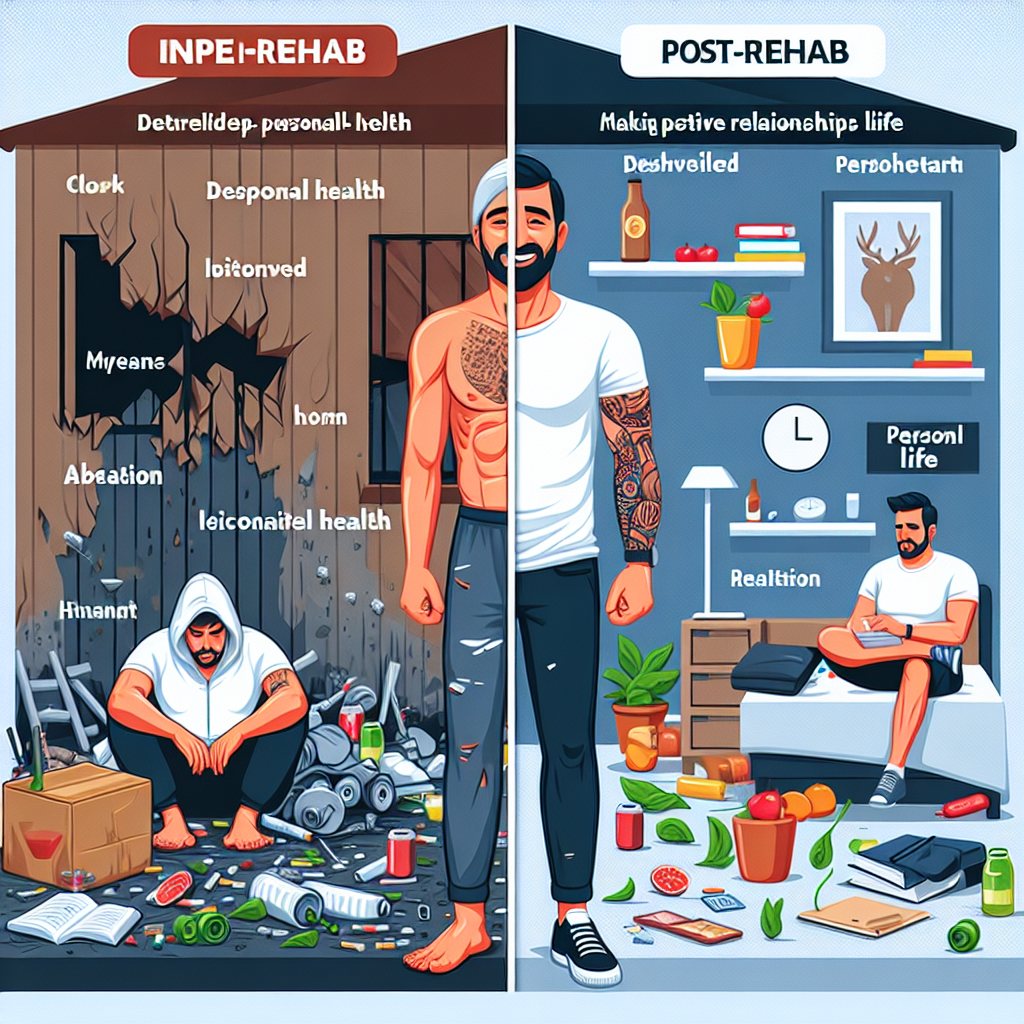-
Table of Contents

“Reclaim Your Life: The Transformative Power of Inpatient Rehab for Alcoholism”
Introduction
Inpatient rehabilitation for alcoholism offers a structured and supportive environment that is crucial for individuals seeking to overcome alcohol dependency. This form of treatment provides 24/7 medical supervision, ensuring that patients receive immediate care during the critical detoxification phase. Inpatient rehab also offers a comprehensive approach to recovery, combining medical treatment with psychological support, counseling, and therapy. This holistic approach addresses the physical, emotional, and mental aspects of addiction, increasing the likelihood of long-term sobriety. Additionally, the immersive nature of inpatient rehab removes individuals from environments that may trigger relapse, allowing them to focus entirely on their recovery journey. With access to a community of peers and professionals, patients can build a strong support network that is essential for sustained recovery.
Comprehensive Care: The Holistic Approach of Inpatient Rehab for Alcoholism
Inpatient rehab for alcoholism offers a comprehensive and holistic approach to recovery, addressing not only the physical aspects of addiction but also the emotional, psychological, and social dimensions. This multifaceted strategy is essential for achieving long-term sobriety and overall well-being. By immersing individuals in a supportive and structured environment, inpatient rehab provides the necessary tools and resources to facilitate profound and lasting change.
One of the primary benefits of inpatient rehab is the immediate access to medical care and supervision. Alcohol withdrawal can be a dangerous and potentially life-threatening process, requiring professional oversight to manage symptoms safely. Inpatient facilities are equipped with medical staff who can administer medications and provide continuous monitoring, ensuring that patients navigate the detoxification phase with minimal discomfort and risk. This level of care is crucial for stabilizing individuals and preparing them for the subsequent stages of recovery.
Beyond the initial detoxification, inpatient rehab centers offer a range of therapeutic interventions designed to address the underlying causes of alcoholism. Through individual counseling, patients can explore the personal and emotional factors that contribute to their addiction. This introspective work is complemented by group therapy sessions, where individuals share their experiences and support one another in a communal setting. The sense of camaraderie and mutual understanding fostered in these groups can be incredibly empowering, helping patients to feel less isolated and more connected to others who are on a similar journey.
In addition to traditional therapy, many inpatient rehab programs incorporate holistic treatments that promote overall wellness. Activities such as yoga, meditation, and art therapy provide alternative avenues for self-expression and stress relief. These practices not only enhance mental and emotional health but also encourage patients to develop new, healthy coping mechanisms. By integrating these holistic approaches, inpatient rehab centers create a well-rounded treatment plan that addresses the mind, body, and spirit.
Another significant advantage of inpatient rehab is the removal of external triggers and distractions. In a controlled environment, patients are shielded from the everyday stressors and temptations that may have contributed to their drinking. This separation allows individuals to focus entirely on their recovery without the constant threat of relapse. The structured daily routines and scheduled activities within the facility also instill a sense of discipline and purpose, which can be instrumental in building a foundation for a sober lifestyle.
Moreover, inpatient rehab programs often include family therapy and education, recognizing the vital role that loved ones play in the recovery process. By involving family members, these programs help to repair relationships and establish a supportive home environment. Educating families about the nature of addiction and recovery equips them with the knowledge to provide ongoing support, which is crucial for sustaining sobriety after leaving the facility.
Ultimately, the holistic approach of inpatient rehab for alcoholism offers a comprehensive and nurturing pathway to recovery. By addressing the multifaceted nature of addiction, these programs empower individuals to heal on multiple levels and build a resilient foundation for a sober future. The combination of medical care, therapeutic interventions, holistic treatments, and family involvement creates a robust support system that fosters lasting change. For those struggling with alcoholism, inpatient rehab represents not just a chance to break free from addiction, but an opportunity to rediscover a healthier, more fulfilling life.
Structured Environment: How Inpatient Rehab Provides Stability for Alcohol Recovery
In the journey toward overcoming alcoholism, the environment in which one seeks treatment plays a crucial role in the success of recovery. Inpatient rehab facilities offer a structured environment that provides the stability necessary for individuals to focus on their healing process. This structured setting is instrumental in fostering a sense of security and routine, which are essential components for those battling addiction.
One of the primary benefits of inpatient rehab is the removal of external distractions and triggers. By residing in a controlled environment, individuals are distanced from the everyday stressors and temptations that may have contributed to their alcohol use. This separation allows them to concentrate solely on their recovery without the constant pressure of their usual surroundings. The absence of these triggers is a significant advantage, as it reduces the likelihood of relapse during the critical early stages of sobriety.
Moreover, the structured environment of inpatient rehab provides a consistent daily routine, which is often lacking in the lives of those struggling with alcoholism. This routine includes scheduled therapy sessions, group meetings, and recreational activities, all designed to promote physical and mental well-being. The predictability of this schedule helps individuals develop a sense of normalcy and discipline, which can be incredibly empowering. As they adhere to this routine, they begin to rebuild their lives with a newfound sense of purpose and direction.
In addition to the daily structure, inpatient rehab offers a supportive community of peers and professionals. The camaraderie among residents, who are all facing similar challenges, creates a sense of belonging and mutual understanding. This support network is invaluable, as it provides encouragement and motivation from those who truly comprehend the struggles of addiction. Furthermore, the presence of trained medical staff and therapists ensures that individuals receive the necessary care and guidance throughout their recovery journey.
The stability provided by inpatient rehab also extends to the comprehensive treatment plans tailored to each individual’s needs. These plans often include a combination of medical detoxification, individual therapy, group counseling, and holistic approaches such as yoga and meditation. The integration of various therapeutic modalities addresses the physical, emotional, and psychological aspects of addiction, offering a well-rounded approach to recovery. This personalized care ensures that individuals receive the specific support they need to overcome their unique challenges.
Another significant aspect of the structured environment in inpatient rehab is the emphasis on education and skill-building. Residents participate in workshops and classes that teach them about the nature of addiction, coping strategies, and relapse prevention techniques. This knowledge empowers individuals to understand their condition better and equips them with the tools necessary to maintain long-term sobriety. By learning how to manage stress, build healthy relationships, and set achievable goals, they are better prepared to navigate life after rehab.
Ultimately, the stability provided by inpatient rehab creates a solid foundation for lasting recovery. The combination of a distraction-free environment, a consistent routine, a supportive community, personalized treatment plans, and educational opportunities fosters an atmosphere conducive to healing and growth. For those struggling with alcoholism, this structured setting offers a beacon of hope and a pathway to a healthier, more fulfilling life. By embracing the stability of inpatient rehab, individuals can take the first crucial steps toward reclaiming their lives from the grip of addiction.
Q&A
1. **Question:** What is one key benefit of inpatient rehab for alcoholism?
**Answer:** One key benefit of inpatient rehab for alcoholism is the structured environment, which helps individuals avoid triggers and focus entirely on their recovery without external distractions.
2. **Question:** How does inpatient rehab for alcoholism support long-term recovery?
**Answer:** Inpatient rehab supports long-term recovery by providing comprehensive therapy and counseling, which address the underlying psychological issues related to addiction and equip individuals with coping strategies to maintain sobriety after discharge.
Conclusion
Inpatient rehab for alcoholism offers numerous benefits, including a structured environment that removes individuals from triggers and temptations, access to comprehensive medical and psychological care, and a supportive community of peers and professionals. This setting facilitates intensive therapy and personalized treatment plans, which can significantly enhance the chances of long-term recovery. Additionally, the immersive nature of inpatient rehab allows for the development of coping strategies and life skills essential for maintaining sobriety post-treatment. Overall, inpatient rehab provides a holistic approach to recovery, addressing both the physical and psychological aspects of alcoholism, thereby increasing the likelihood of successful and sustained sobriety.



